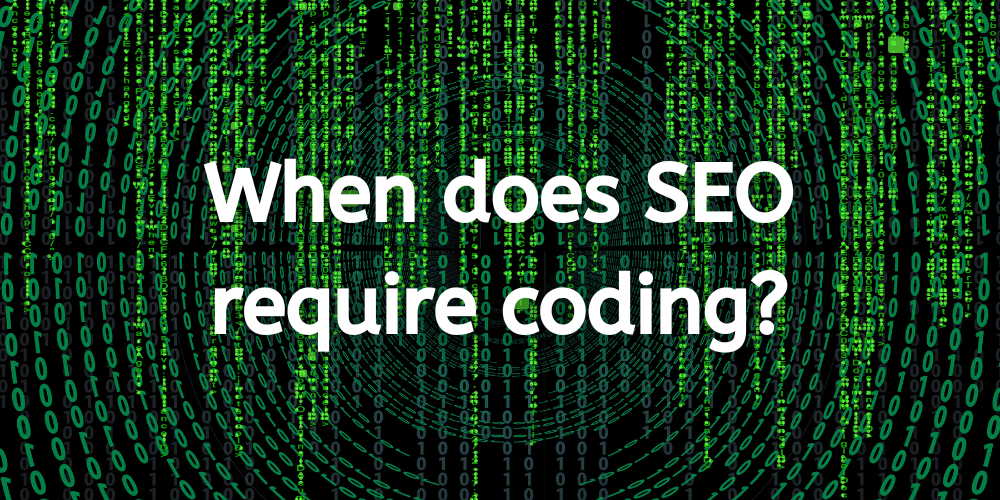1. SEO: A love affair with search engines
Search engine optimisation, or SEO as we know it, is all about making your website the apple of a search engine’s eye. The goal? To get your content ranked higher, bringing more traffic to your site and ultimately, more conversions.
But here’s the thing – search engines are a bit like fussy eaters. They’re constantly changing their taste, and we, as SEO professionals, need to adapt our recipes to keep them coming back for more.
2. So, do I need to code or not?
Well, the answer is both yes and no. There are certain aspects of SEO that require coding skills, while others can be done without ever writing a single line of code. It’s a bit like baking a cake: some people follow the recipe to the letter, while others have a natural flair and can whip up a masterpiece without ever measuring a single ingredient.
3. Coding required: Tinkering under the hood
Let’s start with the areas of SEO where you’ll need to roll up your sleeves and get your hands dirty with some coding.
3.1 On-page optimisation: The devil is in the details
On-page optimisation is all about making your website search-engine-friendly. This includes tinkering with meta tags, headings, and URL structures, which often requires a bit of coding prowess. A well-optimised site is like a well-oiled machine, running smoothly and efficiently to deliver the best user experience.
3.2 Structured data: Feeding the search engine beast
Structured data is like giving search engines a menu to your website, allowing them to easily understand and index your content. Implementing structured data often involves adding specific code snippets to your site, like schema markup, which helps search engines understand and display your content more effectively.
3.3 Speeding up your website: Turbocharge your ranking
Slow websites are the bane of the internet, and search engines hate them too. To keep your site running at top speed, you might need to optimise your code, compress images, and even use a Content Delivery Network (CDN). This often requires coding skills to ensure your website is as quick as a hare, not as slow as a tortoise.
4. Coding not required: SEO magic without coding wands
Now, let’s take a look at the areas of SEO where you can leave your coding cape in the cupboard.
4.1 Keyword research: Finding the right words
Keyword research is about understanding what your target audience is searching for and choosing the right words to get your content noticed. No coding skills required here – just a bit of research, intuition, and a healthy dose of creativity.
4.2 Content creation: Telling the story that matters
Creating high-quality, engaging content is a vital part of SEO. You don’t need to be a coding wizard to write a compelling blog post or produce a captivating video. It’s all about telling a story that resonates with your audience, keeping them hooked and coming back for more.
4.3 Link building: Making friends with the internet
Link building is the art of getting other websites to link to your content, boosting your credibility and search engine rankings. It’s like making friends in the digital world – no coding skills required, just a knack for building relationships and a bit of charm.
5. Hybrid approach: Best of both worlds
Some SEO professionals have a mix of coding and non-coding skills, allowing them to navigate the murky waters of search engine optimisation with ease. This hybrid approach can be incredibly powerful, enabling you to tackle any challenge that comes your way.
6. Learning to code: A worth-while investment?
So, should you learn to code if you’re an SEO professional? While it’s not essential, having coding skills in your toolkit can certainly give you a competitive edge. It’s a bit like being a jack of all trades – the more skills you have, the more valuable you become in the ever-evolving world of SEO.
7. Coding languages: Which one to choose?
If you decide to dip your toes into the coding pool, you might be wondering which programming language to learn. Here are a few popular choices for SEO professionals:
7.1 HTML: The backbone of the web
HTML (Hypertext Markup Language) is the language of the web. It’s used to structure content on the internet and is essential for basic on-page optimisation tasks. Learning HTML is a great starting point for any aspiring SEO coder.
7.2 CSS: Dressing up your website
CSS (Cascading Style Sheets) is the language used to style and format web pages. It’s like the fashion designer of the web, helping you create visually stunning websites that leave a lasting impression. While not directly related to SEO, having a basic understanding of CSS can be beneficial when optimising your site’s appearance.
7.3 JavaScript: Making your site interactive
JavaScript is a versatile programming language that allows you to add interactivity and dynamic content to your website. While it’s not essential for basic SEO tasks, learning JavaScript can help you create more engaging user experiences, which can indirectly improve your search rankings.
7.4 Python: The multi-purpose tool
Python is a popular, multi-purpose programming language that can be used for web development, data analysis, and automation. While not directly related to SEO, Python can be useful for streamlining and automating certain SEO tasks, making your life a whole lot easier.
8. SEO tools: Your coding sidekicks
Even if you’re a coding novice, there are plenty of SEO tools out there that can help you with tasks like keyword research, link building, and on-page optimisation. These tools can be a lifesaver, allowing you to perform SEO tasks without getting bogged down in code.
9. When to call in the experts: Kinsale SEO to the rescue
There comes a time when even the most skilled SEO professionals need a helping hand. That’s where Kinsale SEO comes in. Our team of experts can help you with everything from keyword research and content creation to technical SEO and link building. With our services, you can be sure that your website will be optimised to rank highly in search results, driving more traffic and conversions your way.
10. Conclusion: Unravelling the SEO coding conundrum
So, when does SEO require coding skills, and when does it not? The answer is that it depends on the specific task at hand. Some areas of SEO require coding knowledge, while others can be tackled without ever writing a line of code. By understanding when to use your coding skills and when to rely on other techniques, you can create an SEO strategy that’s tailored to your unique strengths and expertise.
Why not let Kinsale SEO help you on your SEO journey? With our range of services, you can rest easy knowing that your website is in the best possible hands. Learn more about our services here.
Frequently Asked Questions
- Do I need to learn coding for SEO? No, coding is not a mandatory skill for SEO. However, having coding knowledge can give you a competitive edge in the industry and help you perform certain SEO tasks more effectively.
- Which programming languages are most useful for SEO? HTML, CSS, JavaScript, and Python are popular choices for SEO professionals, as they can be used for tasks like on-page optimisation, web development, and automation.
- Can I do SEO without coding? Yes, many aspects of SEO, such as keyword research, content creation, and link building, do not require coding skills. There are also numerous SEO tools available to help you perform tasks without needing to code.
- How can Kinsale SEO help me with my website? Kinsale SEO offers a range of services, including keyword research, content creation, technical SEO, and link building. Our team of experts can help you optimise your website to rank highly in search results, driving more traffic and conversions your way.
- Is JavaScript important for SEO? While not essential for basic SEO tasks, learning JavaScript can help you create more engaging user experiences, which can indirectly improve your search rankings.
- What are some popular SEO tools I can use? There are plenty of SEO tools available, such as Google Analytics, SEMrush, Ahrefs, and Moz, that can help you with tasks like keyword research, link building, and on-page optimisation.
- How can I learn coding for SEO? There are numerous online resources, tutorials, and courses available to help you learn coding languages like HTML, CSS, JavaScript, and Python. Start by focusing on one language and gradually expand your skills as you become more comfortable with coding.
- How long does it take to learn coding for SEO? The time it takes to learn coding for SEO depends on your prior experience and the programming language you choose. With consistent practice and dedication, you can start picking up basic coding skills within a few weeks to a few months.

